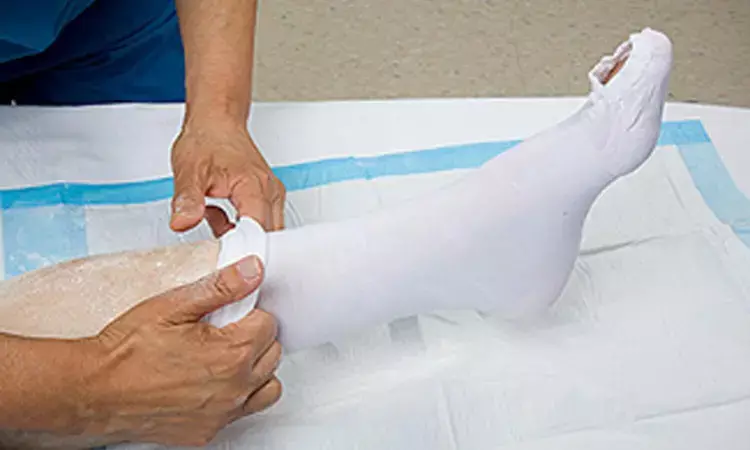- Home
- Medical news & Guidelines
- Anesthesiology
- Cardiology and CTVS
- Critical Care
- Dentistry
- Dermatology
- Diabetes and Endocrinology
- ENT
- Gastroenterology
- Medicine
- Nephrology
- Neurology
- Obstretics-Gynaecology
- Oncology
- Ophthalmology
- Orthopaedics
- Pediatrics-Neonatology
- Psychiatry
- Pulmonology
- Radiology
- Surgery
- Urology
- Laboratory Medicine
- Diet
- Nursing
- Paramedical
- Physiotherapy
- Health news
- Fact Check
- Bone Health Fact Check
- Brain Health Fact Check
- Cancer Related Fact Check
- Child Care Fact Check
- Dental and oral health fact check
- Diabetes and metabolic health fact check
- Diet and Nutrition Fact Check
- Eye and ENT Care Fact Check
- Fitness fact check
- Gut health fact check
- Heart health fact check
- Kidney health fact check
- Medical education fact check
- Men's health fact check
- Respiratory fact check
- Skin and hair care fact check
- Vaccine and Immunization fact check
- Women's health fact check
- AYUSH
- State News
- Andaman and Nicobar Islands
- Andhra Pradesh
- Arunachal Pradesh
- Assam
- Bihar
- Chandigarh
- Chattisgarh
- Dadra and Nagar Haveli
- Daman and Diu
- Delhi
- Goa
- Gujarat
- Haryana
- Himachal Pradesh
- Jammu & Kashmir
- Jharkhand
- Karnataka
- Kerala
- Ladakh
- Lakshadweep
- Madhya Pradesh
- Maharashtra
- Manipur
- Meghalaya
- Mizoram
- Nagaland
- Odisha
- Puducherry
- Punjab
- Rajasthan
- Sikkim
- Tamil Nadu
- Telangana
- Tripura
- Uttar Pradesh
- Uttrakhand
- West Bengal
- Medical Education
- Industry
Compression stockings might not be needed to prevent blood clots after surgery

Graduated compression stockings are special stockings that help promote circulation in legs in high risk patients to prevent venous thromboembolism or VTE.
Researchers have found that compression stockings might not be needed to prevent blood clots after surgery and hence current guidelines should be revised.
Compression stockings might be unnecessary to prevent blood clots in most patients undergoing elective surgery, finds a clinical trial published by The BMJ today.
The results suggest that giving anti-clotting drugs alone is just as effective and, as such, the researchers say current guidelines based on historical data should be revised.
Current guidelines recommend using a combination of graduated compression stockings and anti-clotting drugs for patients undergoing elective surgery who are at moderate or high risk of VTE. However, in recent years, rates of VTE after surgery have fallen significantly due to improved care and drug therapy, leading some doctors to suggest that this combination might no longer be necessary.
So a team of UK researchers set out to investigate whether the use of graduated compression stockings offers any additional benefit to anti-clotting drugs to prevent VTE in patients undergoing elective surgery.
Their findings are based on 1,858 adult patients at moderate or high risk of VTE who underwent non-emergency surgery at seven NHS hospitals across the UK between May 2016 and January 2019.
Patients were randomly split into two groups. A total of 937 patients were only given anti-clotting drugs (low-molecular-weight heparin or LMWH) during their hospital stay and were asked not to wear any kind of compression stocking for 90 days after surgery.
The remaining 921 patients were given the same anti-clotting drugs and were asked to wear graduated compression stockings during their hospital stay.
The main outcome was a scan showing a blood clot in the lower leg (deep vein thrombosis) or in the lung (pulmonary embolism) within 90 days of surgery. Other measures included quality of life, adverse reactions to anti-clotting drugs, and death from any cause.
The researchers found that VTE occurred in 16 out of 937 (1.7%) patients in the drugs only group compared with 13 out of 921 (1.4%) patients in the drugs plus stockings group.
Both deep vein thrombosis and pulmonary embolism occurred in 2 out of 937 (0.2%) patients in the drugs only group compared with 1 out of 921 (0.1%) in the drugs plus stockings group.
Little or no differences between groups were found for other measures including quality of life up to 90 days after surgery, adverse drug reactions or deaths.
The researchers point to some limitations, such as the possibility of missed scans, but say this would probably not have influenced the overall findings. Results were also similar after further analyses, suggesting that the findings withstand scrutiny.
As such, they say that in patients who have elective surgical procedures and are at moderate or high risk of venous thromboembolism, preventive drug treatment alone is "non-inferior" to a combination of drug treatment and graduated compression stockings.
"These findings indicate that graduated compression stockings might be unnecessary in most patients undergoing elective surgery, and current guidelines based on historical data should be revised," they conclude.
Journal: The BMJ
For further reference log on to
: https://www.bmj.com/content/369/bmj.m1309
Dr Kamal Kant Kohli-MBBS, DTCD- a chest specialist with more than 30 years of practice and a flair for writing clinical articles, Dr Kamal Kant Kohli joined Medical Dialogues as a Chief Editor of Medical News. Besides writing articles, as an editor, he proofreads and verifies all the medical content published on Medical Dialogues including those coming from journals, studies,medical conferences,guidelines etc. Email: drkohli@medicaldialogues.in. Contact no. 011-43720751


